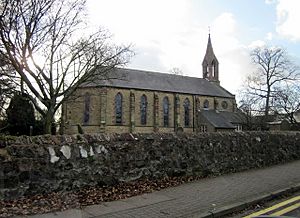Christ Church, Quinton facts for kids
Quick facts for kids Christ Church, Quinton |
|
|---|---|

Christ Church, Quinton
|
|
| 52°27′43.04″N 2°00′33.22″W / 52.4619556°N 2.0092278°W | |
| Location | Quinton, Birmingham |
| Country | England |
| Denomination | Church of England |
| Churchmanship | Open Evangelical |
| History | |
| Dedication | Christ |
| Architecture | |
| Style | Early English |
| Groundbreaking | 1840 |
| Completed | 1841 |
| Construction cost | £2,500 |
| Administration | |
| Parish | Christ Church at the Quinton |
| Deanery | Edgbaston |
| Archdeaconry | Birmingham |
| Diocese | Anglican Diocese of Birmingham |
Christ Church, Quinton is a special church in the Church of England. It is located in Quinton, Birmingham, a part of England.
Contents
Building Christ Church
The land for Christ Church was given by George Lyttelton, 4th Baron Lyttelton. He helped start the building by laying the first stone on July 19, 1839. The church was designed by an architect named Richard Charles Hussey.
Opening the Church
The church and its burial ground were officially opened on September 18, 1840. This special ceremony was led by Dr Robert Carr, who was the Bishop of Worcester at the time.
Parish Changes Over Time
- In 1842, Christ Church became its own church area, called a parish. This area was created from parts of St John the Baptist Church, Halesowen's parish.
- Later, in 1863, the parish grew bigger. It started to include parts of the areas known as Lapal and Hill.
- In 1869, some of the northern part of the parish was moved to a new church area. This new area was for St Paul's, Blackheath parish.
- The church building was updated in 1890 by Frank Barlow Osborn and Alfred Reading.
- A new entrance porch was added to the church in 1928.
- In 1933, a section of the parish was used to create a new parish. This new area became home to St Faith and St Laurence's Church, Harborne.
Burial Ground Information
The churchyard at Christ Church was used for burials for many years. It was closed for new burials in 1889. From 1840 until it closed, 1,415 people were buried there. A new burial ground was opened in 1890. The Bishop of Worcester also officially opened this new burial ground.
Church Organs
Christ Church has had several different organs over the years.
First Organ
- The first organ was a pipe organ with two keyboards.
- It was made by John Banfield and put in the church in 1868.
- This organ was used for many years.
- In 1919, it was sold to the Waterfall Lane Mission in Old Hill.
Second Organ
- A new two-keyboard organ replaced the first one.
- It was made by J J Binns from Leeds.
- This organ was officially started in December 1919.
- It was used at Christ Church for over 40 years.
- Later, it was moved to the Church of the Epiphany in Corby, Northamptonshire.
Later Organs
- In January 1963, a different kind of organ was brought in. This was an old cinema organ.
- Then, in 1987, an electronic organ replaced the cinema organ. This electronic organ was made by Makin of Oldham.

